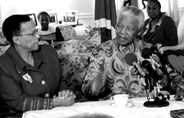by Askia Muhammad
White House Correspondent
 THE WHITE HOUSE (FinalCall.com)�The U.S. military actions in
response to the Sept. 11 terrorist attacks can be justified, only if
they are limited to accurately identifying and punishing those who were
directly responsible, former South African President Nelson Mandela told
Pres. George W. Bush.
THE WHITE HOUSE (FinalCall.com)�The U.S. military actions in
response to the Sept. 11 terrorist attacks can be justified, only if
they are limited to accurately identifying and punishing those who were
directly responsible, former South African President Nelson Mandela told
Pres. George W. Bush.
"The United States of America lost 5,000 innocent people, and it is
quite correct for the president to ensure that the terrorists, those
masterminds, as well as those who have executed the action and survived,
are to be punished heavily," Mr. Mandela told reporters in the Rose
Garden Nov. 12 in what may be his valedictory White House appearance.
But Mr. Mandela�s support for the U.S. military campaign is limited
to identifying and pursuing only those responsible for the World Trade
Center and Pentagon attacks, and came with a stiff rebuke for Mr. Bush
regarding his snub of Palestinian Authority President Yasser Arafat at
the recent United Nations General Assembly Summit conference, and a
strong defense of Saudi Arabia�s role in the crisis.
"When I met with the president yesterday, I expressed grave concern
at his refusal to meet President Arafat," Mr. Mandela told reporters at
the South African Embassy. "The United States of America is the mediator
between the Arabs and the Israelis, and for the President of the United
States to meet [Prime Minister Ariel] Sharon and to refuse to meet
Arafat, I indicated to him that I�ve got serious reservations about
that."
Mr. Mandela complained to reporters of what he considers "an
unacceptable hostility toward the Kingdom of Saudi Arabia" by the news
media in this country.
"It must be remembered that Saudi Arabia is the cradle of Islam. That
is where the Holy Prophet Muhammad lived and died. About one billion
Muslims, every year, go to Mecca and Medina to pay respects to the Holy
Prophet. Therefore we cannot expect Saudi Arabia to send forces to
Afghanistan. It is quite sufficient for them to condemn the terrorist
attack, and express their sympathies to the United States on the death
of innocent and defenseless civilians," he said.
When asked about his advice concerning the use of force or "terror"
by liberation movements, Mr. Mandela�winner of the Nobel Peace Prize in
1993 and the first African leader to be awarded the U.S. Congressional
Gold Medal in 1998�pointed to his own African National Congress as the
best example for not only waging armed struggle against an oppressor,
but as an example on how to transfer power.
"I do not agree with you that the ANC used terrorism in the past," he
told a reporter, because "the white majority went to using the name of
God to justify the commission (of crimes) against the overwhelming
majority of the population, because they were Black. That is the type of
regime we were dealing with.
"They refused to meet us and intensified oppression. What else could
we do? The methods that are used by the oppressed are determined by the
oppressor himself. If the oppressor uses negotiations�they want to sit
down and speak with us�we would never have used force. But when they
refused to talk to us, and intensified oppression, what other method did
we have except to take up arms?
"Never in our history were we terrorists. We are the people who took
the initiative, and went to our enemies and said: �Why must we continue
killing one another when as South Africans we could sit down and resolve
our problems through peaceful means?� That�s what we did. The initiative
did not come from the government. It came from us. [It] did not come
from the United States. The United States government was supporting the
apartheid regime."
At 83 years of age, Mr. Mandela also assured reporters that while his
doctors are confident that he has overcome a recent bout with cancer, he
is content with his life�s accomplishments.
Photo: Former Nelson Mandela (right) at South African
Embassy in Washington with Shelia Sisulu, ambassador from South Africa
to the U.S.

![]()